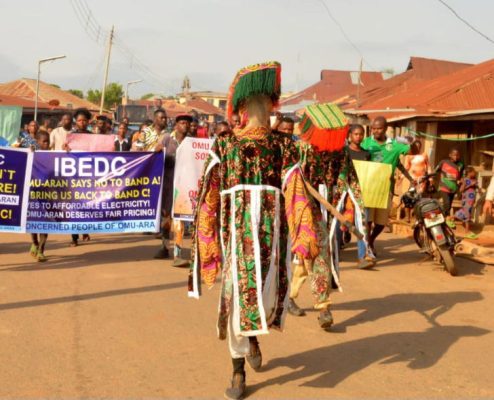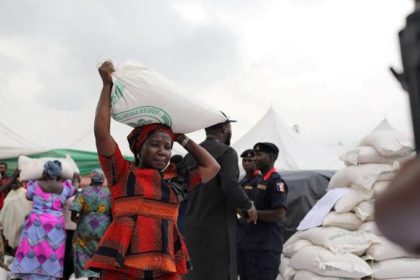
By Dauda Kareem | Staff Reporter
Ilorin Kwara State.
In a dramatic display of cultural symbolism and civic unrest, two masquerades led a procession of irate youths through the streets of Omu-Aran, Irepodun Local Government Area of Kwara State, protesting the Ibadan Electricity Distribution Company’s (IBEDC) abrupt reclassification of the town from Band C to Band A, resulting in a significant increase in electricity tariffs.
The protest, which unfolded on Thursday, April 10, 2025, saw residents expressing their frustration over what they described as “outrageous billing” and “sudden reclassification” by IBEDC. The inclusion of masquerades, revered figures in Yoruba culture, underscored the depth of the community’s discontent.
Chanting protest songs and carrying placards with inscriptions such as “No to Exploitation” and “IBEDC: Stop the Crazy Bills,” the demonstrators marched from the IBEDC office in Oluseyi to the local government secretariat and the office of the police area commander. The procession disrupted vehicular movement and drew the attention of passersby, many of whom joined in solidarity.
Alameen Yusuf, a youth community in the community expressed deep dissatisfaction with IBEDC’s services and the attitude of its workers.
He pointed out the community’s contributions to maintaining and renovating IBEDC facilities, efforts he claimed have gone unreciprocated.
He said “Not only have we invested but we have given our resources to support IBEDC, yet we’re met with cutthroat bills and poor service. This reclassification to Band A is unjust and burdensome,” He stated.
Mrs. Comfort Ajiboye, Vice-Chairman of Irepodun LGA, received the protesters on behalf of the council chairman, urging them to remain peaceful and law-abiding. She assured the demonstrators that their grievances would be documented and addressed appropriately.
The police area commander, Mr. Ayodele Olatunji, also appealed for calm, promising that the command would intervene to ensure an amicable resolution.
In response to the protest, Mr. Mikail Bello, the Business Manager of IBEDC in Omu-Aran, attributed the increase in charges to a rise in power consumption within the community. He noted that consumption had surged from 70 units to 350 units due to recent improvements in electricity transmission across the state.
“The reclassification to Band A reflects the enhanced power supply in the area. We understand the concerns and are open to dialogue to address any issues,” Mr. Bello explained.
The situation in Omu-Aran is emblematic of a broader discontent with electricity distribution companies across Nigeria. In May 2024, the Association of Hotel Owners in Kwara State staged a protest in Ilorin over what they termed as “outrageous and insensitive” tariff hikes by IBEDC. The association’s president, Alhaji Dauda Akande, lamented the increase in tariffs from N74 to N225 per unit for Band A customers, a move he claimed threatened the survival of businesses and could lead to massive job losses.
Similarly, residents in Abuja have expressed frustration over arbitrary migrations to Band A billing without corresponding improvements in power supply. Consumers reported being charged higher rates while still experiencing frequent outages, leading to accusations of exploitation and calls for regulatory intervention.
Omu-Aran’s grievances with IBEDC are not new. In December 2013, the community protested a five-month blackout and alleged extortion by the company. Residents claimed they had paid for the repair of a faulty transformer without any response from IBEDC, leading to prolonged darkness and economic hardship.
These recurring issues highlight systemic problems within Nigeria’s power sector, including inadequate infrastructure, lack of transparency, and poor customer service. The National Electricity Regulatory Commission (NERC) has been urged to enforce stricter oversight and ensure that distribution companies adhere to fair billing practices.
The recent protests have intensified calls for NERC to intervene and address the grievances of electricity consumers. Stakeholders argue that without regulatory action, the trust between consumers and distribution companies will continue to erode, potentially leading to more widespread unrest.
“We implore NERC to investigate these arbitrary reclassifications and ensure that any changes in billing are justified and communicated transparently,” Chief Owolabi emphasized.
The protest in Omu-Aran underscores the growing frustration among Nigerians over electricity tariffs and service delivery. As communities continue to grapple with economic challenges, the demand for fair and reliable power supply becomes increasingly urgent. The involvement of cultural symbols like masquerades in the protest reflects the depth of societal discontent and the need for immediate and effective solutions.



